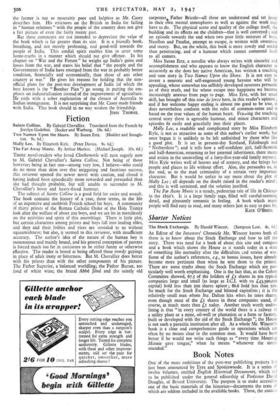Fiction
Sainte Conine. By Gabriel Chevallier. Translated from the French by Jocelyn Godefroi. (Seeker and Warburg. 10s. 6d.) Mally Lee. By Elizabeth Kyle. (Peter Davies. 9s. 64.)
The Far Away Music. By Arthur Meeker. (Michael Joseph. 10s. 6d.)
THOSE novel-readers who loved CIochemerle will turn eagerly now to M. Gabriel Chevallier's Sainte Conine. Not being of those however; being in fact one—among very few, I believe—who could do no more than skim over that sniggering and facetious success, this reviewer opened the newer novel with caution, and closed it having indeed been episodically more rewarded and persuaded than she had thought probable, but still unable to surrender to M. Chevallier's bossy and heavy-fisted humour.
The subject of Sainte Colline is a good field for satire and assault. The book contains the history of a year, three terms, in the life of an expensive and snobbish French school for boys. A community of thirty priests of the Roman Catholic Order of the Holy Trinity look after the welfare of about zoo boys, and we are let in mercilessly on the activities and spirit of this assemblage. There is little plot, but certain characters among priests and boys fall into leading roles, and they and their foibles and vices are revealed to us without squeamishness; but also, it seemed to this reviewer, with insufficient accuracy. The author's idea of the nature of the human boy is monotonous and mainly brutal, and his general conception of parents is forced much too far in caricature to be either funny or otherwise effective. The reader is bored at being offered these rowdy guyings in place of adult irony or bitterness. But M. Chevalier does better with his priests than with the other components of his picture. The Father Superior, a balanced worldling; the Father Bursar, too fond of white wine; the biutal Abbe jibul and the saintly old carpenter., Father Bricole—all these are understood and set justly in their own mental atmospheres as well as against the work they have to do. The physical scene and quality of the college itself, the building and its effects on the children—that is well conveyed ; and an episode towards the end when two poor little miseries of boys, Nusillon and Patafiat, attempt to escape, is written with sweetness and mercy. But, on the whole, this book is more rowdy and sordid than penetrating, and of a humour which cannot commend itself to all corners.
Miss Susan Ertz, a novelist who always writes with sincerity and accomplishment and who appears to know the English character as accurately as she does her native American, has written a touching and sane story in Two Names Upon the Shore. It is not easy to invent a neurotic and self-engrossed young heroine who will be appealing, whose somewhat too selfishly developed neuroses persuade us of their truth, and for whose escape into happiness we become increasingly anxious from page to page. Miss Ertz, with her usual skill, has brought off this tour de force here, in this reader's opinion ; and if her welcome happy ending is almost too good to be true, it does nevertheless conform with the rules of common-sense and is based on the true values of the human heart. Framing the touching central story there is agreeable humour, and minor characters and episodes fit easily and gracefully into their places. Mally Lee, a readable and complicated story by Miss Elizabeth Kyle, is not as attractive as some of this author's earlier work; but once begun it is unlikely to be left unfinished by those who like a good plot. It is set in present-day Scotland, Edinburgh and " Nethershire "; and it tells how a self-confident -girl, half-Scottish and half-American, returning to her paternal inheritance, there meets and assists in the unravelling of a forty-five-year-old family mystery. Miss Kyle writes well of houses and of scenery, and she brings her people and places to life without effort. Also, she persuades us, in the end, as to the mad criminality of a certain very important character. But it would be unfair to say more -about the plot of Mally Lee ; all depends on the doubt raised in the reader's, mind ; and this is well sustained, and the solution justified.
The Far Away Music is a steady, pedestrian tale of life in Chicago in the 1850's. It is a large family saga, filled will careful-seeming detail, and pleasantly romantic in feeling. A book which many people will find easy to read, and many others just as easy to pass by.
KATE O'BRIEN.


































 Previous page
Previous page